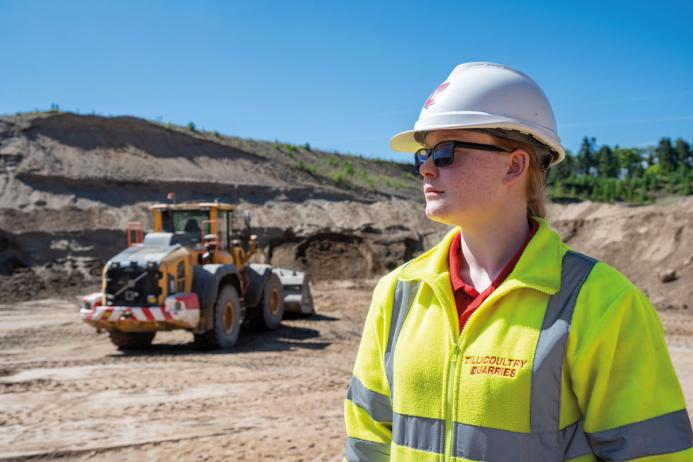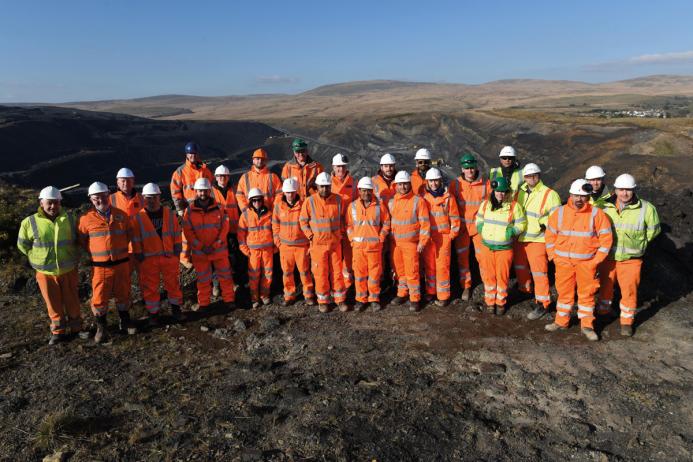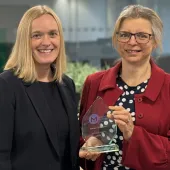Diversity, Equity and Inclusion: No Time to Stop

First published in the June 2025 issue of Quarry Management
Why UK businesses should double down on effective DEI strategies, embedding inclusion in their cultures, measuring outcomes, and aligning initiatives with clear business goals
Reading the mood music on diversity, equity and inclusion (DEI) is arguably more problematic than at any other time since the inception of the idea. DEI is facing a backlash. Loud geopolitical voices, incessant media attention, and businesses scaling back their DEI initiatives are all conflating towards a negative narrative. In a recent BBC press article, it was reported that Meta had sent a staff memo stating they were ‘scraping their diversity, equality and inclusion efforts due to a shifting legal and policy landscape’ (BBC, 2025).
However, is that narrative the truth? Is it not more important to establish facts over bias and understand what DEI is about and why? Far from being rejected as ‘woke nonsense’, it is a strategic imperative for UK business.
There remains mounting evidence that diverse and inclusive workplaces drive better outcomes including improved decision making, higher profitability, and greater innovation.
Moreover, in an industry with significant skills shortages and an ageing workforce, the need to attract young talent has become a priority. Young and diverse talent are likely to shun employers perceived as unwelcoming and a drop in applications or higher turnover could be the consequence. DEI is no longer a ‘nice to have’ but a necessity in the fight for talent and succession.
Labour numbers and new skillsets
The Labour Government has committed to building 1.5 million homes and to invest in effective infrastructure. As a result, significant growth is expected in the years to 2035, and an estimated 252,000 additional workers will be needed by 2028 to meet construction demand.
The built environment within the UK is suffering from significant skills shortages across multiple industries, including mineral products and mining.
In 2023, 31% of construction employers reported challenges finding suitably skilled staff. Labourers, plant operators, trades personnel, engineers, and managers are some of the high-priority roles for 2024–2028 owing to low supply and high demand. Within mineral products, around a third of the workforce will reach retirement age over the next 10 years, with significant numbers and expertise leaving the sector.

From a diversity perspective, the built environment is heavily male dominated and in fact, the most non-diverse of all industries. Evidently, construction employs 84.2% males, mineral products 80%, and mining (globally) between 83% and 92%.
The sustainability agenda also creates an added pressure as industry will require a whole new set of skills to meet stakeholder demand for decarbonization and net zero, as well as the wider sustainability requirements, including social value. Whether it is sustainability or change management, maintaining renewable energy technologies or expertise with automated plant, the skillsets required from our workforce are changing and will continue to change considerably.
Considering the challenges the industry faces, increasing diversity is a mechanism that should be used to increase labour numbers and optimize talent and skills. The recent Government Skills England Report states ‘to meet the growing demand for labour in other emerging or expanding sectors, historically male-dominated industries may need to increase female participation’ (Department for Education, 2024).
Decision-making and risk management
Gender-diverse leadership also improves decision quality. UK financial regulators have long argued that better representation of women and minorities in city firms can ‘help prevent groupthink and support more effective risk management’ (Politico, 2025). In practice, diverse teams bring different perspectives that challenge assumptions and uncover new opportunities. Research by POWERful Women found management teams with above-average gender diversity reported 19% higher innovation revenue. Likewise, Great Place to Work observes that firms embracing DEI tend to generate greater readiness for innovation. In today’s fast-changing markets, this creative edge can translate into new products and customers.
Talent attraction, retention, and engagement
DEI is also critical for attracting and retaining top talent. Many candidates consider a company’s diversity reputation when choosing employment, so cutting DEI can make a firm less attractive to new talent.
A strong DEI culture can also positively impact on employee morale and satisfaction, with inclusive workplaces enjoying higher employee retention rates. Inclusive cultures give under-represented staff a sense of belonging and mitigate the ‘leaky pipeline’ that is often witnessed in male environments, with females joining but leaving owing to cultural barriers.
As one business columnist warns, ‘firms that nurture inclusivity are more likely to attract top talent, improve staff retention, and spur innovation, while treating DEI as a mere checkbox (or abandoning it) will risk alienating current and potential employees, undermining trust and losing competitive edge’ (bmmagazine.co.uk, 2025).

Innovation and creativity
Numerous studies link diversity to creative performance. In mixed-gender teams, varied life experiences and viewpoints encourage out-of-the-box thinking. For example, McKinsey’s global analysis confirms that companies with diverse leadership teams not only see better financial results, but also bring more ideas to market. Powerfully, EY (formerly Ernst & Young) UK note ‘diversity, equity and inclusion … are critical drivers of innovation, productivity, and economic growth’ (www.ey.com, 2024).
In practical terms, companies with diverse teams often introduce new products, services or processes more successfully than uniform teams. This is vital across sectors. For instance, construction and engineering firms adopting diverse workforces have documented more creative problem-solving and productive approaches on complex projects.
Minerals Matter DEI working group
Minerals Matter is in the process of setting up a working group to discuss the current DEI challenges in the minerals and mining sector, examining what companies are doing and utilizing this collective group to accelerate and support effective change.
Profitability
A wide body of research links gender diversity to stronger financial performance. For example, a recent McKinsey study found that companies in the top quartile for gender diversity on executive teams were 39% more likely to have above-median profitability than those in the bottom quartile. Industry data bear this out in UK contexts too. The Chartered Institute of Building (CIOB) notes that every 10 percentage-point increase in women’s representation on senior executive teams correlates with a 3.5% rise in EBIT. Likewise, UK energy sector group POWERful Women reports companies with 15% or more women in senior roles show 50% higher profitability than those with less than 10%. Having just one female director on a corporate board has been shown to yield roughly 5% higher annual stock returns versus all-male boards.

Sustainability and social value
In an era where sustainability has effectively become a licence to trade, where clients are awarded contracts on their ability to meet key metrics, including diversity, retreating from DEI could present risks from a commercial and brand perspective.
Similarly, investment decisions can be linked to ESG/DEI practices and failure to comply could lead to missed opportunities. Companies also need to be mindful of the legislation that surrounds DEI in the UK. Whether it is gender pay gap reporting or increased obligations on businesses for KPIs and delivery of social value commitments (under the Procurement Act 2023), lack of compliance could have contractual or legal consequences.
Tillicoultry Quarries – Building a more diverse workforce
Sophia Westerhuis’ journey to being appointed to the board at Tillicoultry Quarries is evidence of how a determined vision and company culture can translate into effective results.
Sophia has worked with Tillicoultry Quarries for nearly nine years, joining the business in 2016 as part of the leadership team to develop and strengthen their people function. While there have certainly been challenges along the way, particularly in a sector that has historically struggled with gender diversity, she is proud that her experience as a woman in a leadership role within the extractives industry has been extremely positive. In October 2024, Sophia was appointed to the board of directors.
Throughout her time, she has been involved in shaping decisions across the business, particularly in the areas of talent management and brand awareness, which have been integral to growth. She believes it is vital that more women are afforded similar opportunities to contribute their skills and perspectives to our industry. With ongoing skills shortages, companies must understand how the industry is perceived and work to remove any barriers that prevent it from attracting and retaining the talent needed to grow and meet future demand. Notably, 51% of the population is female and overlooking that potential would be a missed opportunity.
At Tillicoultry Quarries, the approach to improving diversity has focused on three key areas: recruitment, education, and perception. Over the last nine years, there has been a clear focus on attracting talent into the business and the company has had great success owing to its transparent and inclusive recruitment approach, supported by a considerable investment in the training and development of people. By offering multiple routes into the business, Tillicoultry have attracted talent from a broad range of backgrounds, reduced the average age of the workforce, and strengthened the pipeline for future resourcing.

A key positive development has been the focus on engaging with young people in the local communities they serve. Bridging the skills gap requires more than just advertising vacancies; it involves educating young people, and those who influence them, about the variety of opportunities our industry offers. Tillicoultry made a conscious effort to move beyond traditional job descriptions and instead share real career stories, highlighting the wide range of skills the sector needs, and actively challenging gender stereotypes.
They have worked together with Minerals Matter, accessing excellent resources and establishing strong relationships with local primary and secondary schools. Recent workshops have led to site visits by students and teachers, giving them first-hand experience of what is done and what an inclusive culture looks like in practice. These connections are already helping young people explore rewarding careers and will contribute to a more diverse and sustainable future for the industry.
Internally, educating their own workforce about gender diversity has also been a key focus. Lasting change must start from the top, so a leadership-led approach, with strong engagement from the board and senior team is essential.
‘We are incredibly proud to have so many women within our business, working across a wide variety of roles. Their achievements and contributions are regularly featured in our newsletters and on our website, offering amazing case studies that demonstrate their impact on our success and growth. I am hopeful our holistic approach to gender diversity is helping to break down stereotypes and will contribute towards a stronger, more sustainable future for our industry,’ said Sophia.
The evidence is clear
Diversity, equity, and inclusion, especially improving gender balance, is not just an ethical issue but has proven business benefits. Companies that recruit and promote inclusively tap into a wider talent pool, spur innovation with fresh ideas, achieve higher profitability, and positively contribute to their social value. In male-dominated sectors such as construction, mineral products, and mining, this is especially critical. Expanding the workforce to include women and other underrepresented groups helps meet chronic skills shortages and fosters creative solutions. Conversely, dropping DEI efforts risks reinforcing recruitment gaps, squandering employee engagement, and falling behind more inclusive competitors. In short, the political ‘anti-DEI’ surge may win headlines, but the data suggest it would be a strategic mistake for UK businesses to abandon the demonstrable benefits of a diverse, inclusive workforce.
UK businesses should, therefore, double down on effective DEI strategies, embedding inclusion in their cultures, measuring outcomes, and aligning initiatives with clear business goals. In the current climate, resisting political pressure and staying the course is likely to pay off. As one UK study found, authentically investing in DEI enhances long-term market value and innovation, while having no adverse short-term impact on performance. Ultimately, an inclusive workplace is more resilient, adaptable, and profitable – a lesson UK industry cannot afford to ignore.
Subscribe to Quarry Management, the monthly journal for the mineral products industry, to read articles before they appear on Agg-Net.com








